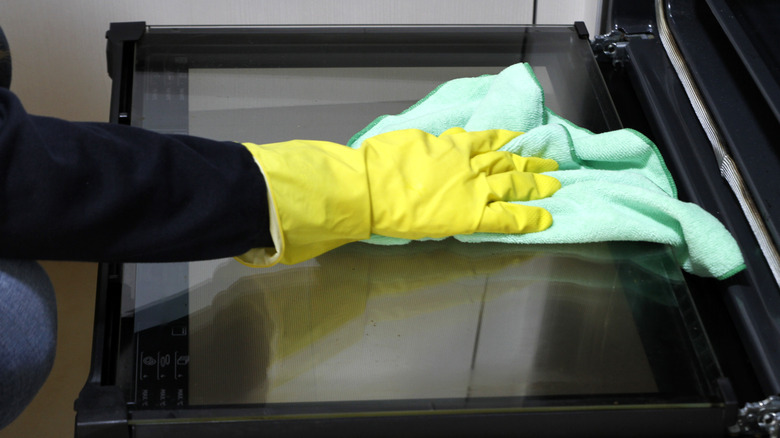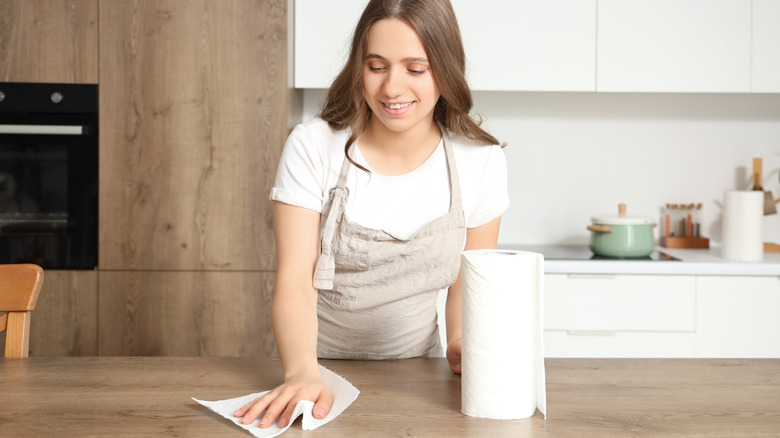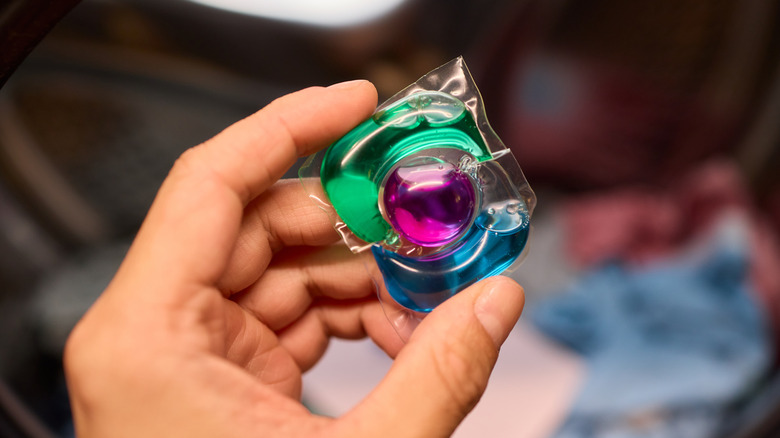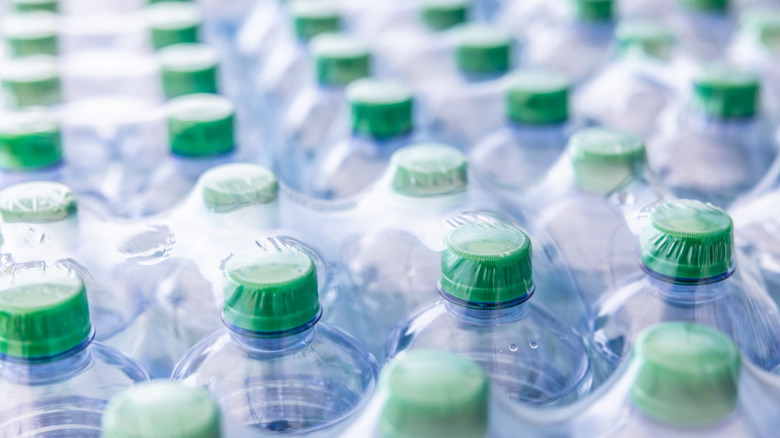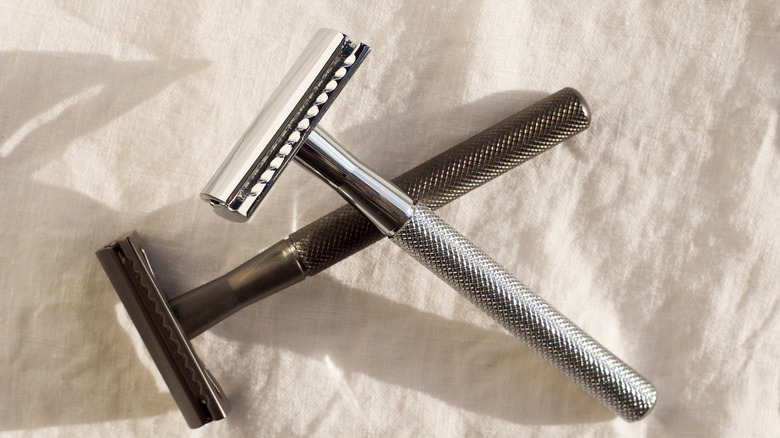5 Household Items You Should Stop Buying To Save More Money
These days, Americans are increasingly turning toward penny pinching efforts. With the economy, and the stock market, experiencing new challenges, consumers everywhere are looking for ways to stretch their dollar farther. Things like housing costs and groceries (particularly skyrocketing staples like eggs) are increasing, sending budgets into a tailspin in the process. While cutting out unnecessary expenses — like streaming subscriptions or your second or third takeout order in a week — can go a long way towards transforming your budget, there are other avenues you can and should explore when looking to save a bit of cash.
Case in point, when you do your grocery shopping there are actually a variety of items that can be entirely eliminated. For example, typical supermarket staples like cleaning sprays can be replaced by baking soda and vinegar instead. Making this small change can not only save you a heap of money but also deliver a more natural cleaning experience that doesn't lose any scrubbing or cleansing power. The best part is that this is just one product category among a variety of others that can be replaced for tremendous savings on your weekly shopping list.
Oven cleaners
Oven cleaners are perhaps one of the worst household products you can buy today. While they certainly get the job done, even oven manufacturers recommend against using them. This should give anyone who needs to clean their oven pause when considering how to get the job done. The chemical makeup of most readily available oven cleaners is a caustic blend that shouldn't be touched with your bare skin let alone inhaled. These chemicals can stain just about anything and they can sometimes produce severe reactions in the inevitable event that you spill some on yourself or a surface you wanted to keep undamaged. These chemicals are exceedingly harsh and, if left to their own devices for long enough, can actually damage your appliance rather than cleaning it.
A baking soda and water paste is an easy alternative that can deliver immense cleaning power without the intense safety precautions necessary when working with more volatile chemical solutions. Using this paste mix in the same way you would a commercial oven cleaner –- scrubbing it into the surfaces of your oven and allowing it to sit overnight –- will frequently deliver the same results without the panic inducing terror of working with more dangerous chemical products. As well, these basic ingredients are easy to come by and far less expensive.
Paper towels
Paper towels are a common staple in the modern household. Not only are they easy to find in stores and supermarkets everywhere, but they're easy to use and often exceedingly effective at cleaning up spills and other messes around the house. You can even use them with household cleaning products when tackling your routine kitchen or bathroom tidy up. But the reality is that they aren't actually necessary, and that paper towels can add considerably to your weekly grocery bill. Plus, paper towels are generally crafted from paper pulp that is at or near the end of its recyclable lifespan — meaning they aren't recyclable after use. Mincing paper down to this level makes it useful for only this configuration and, unfortunately, reduces its ability to be reconstituted into something else. This makes paper towels less than sustainable.
Luckily, an old school alternative for the contemporary paper towel is actually more hygienic, sustainable, and affordable. Purchasing cotton cloths or towels can offer greater sustainability due to their ability to be reused long term, and even repurposed. Similarly, buying a set of dish towels and reusing them consistently can save you money over the long run. Approaching your cleaning tasks this way can also eliminate the need to constantly buy new bulk packages of paper towels — allowing you to be both cost effective and environmentally friendly.
Laundry detergent pods
In recent years, there has been much made about the seemingly appealing nature of detergent pods when it comes to the mouths of children; and it was even a horrifying trend among teenagers at one point. Eating these pods can bring about disastrous consequences, which is why many detergent brands now include childproof packaging for their products. However, the veracity of childproofing mechanisms in laundry detergent isn't the main reason you should consider making a switch to the more traditional laundry detergent formats.
The reality is that pod variants of laundry detergent cost significantly more per load than a box of detergent powder or package of liquid detergent. While making the switch away from these brightly colored pods can save you plenty of cash, this isn't the only reason that using detergent pod may be hurting you financially. Some have suggested that laundry pods (which typically use more detergent than required per load) can actually leave your clothes dirtier after going through a wash cycle. This means that spending more on the detergent you use to clean your clothes may also deliver a secondary punch to your wallet by making you buy new items of clothing more often.
Bottled water
Bottled water is truly one of the greatest rackets of modern society. Whoever thought up the idea of taking a natural resource that exists in tremendous abundance and selling it for sometimes up to a 4,000% markup was an evil genius. Most bottled water comes from natural spring resources, meaning the water is derived from public landscapes and waterways — or is the same water that flows through your home faucet (Dasani actually tried selling tap water in Britain in 2004).
No matter how you slice it, buying bottled water is a great way to spend far more of your hard earned cash than you need to, so whenever you can help it you should opt for easily accessible filtered tap water rather than its pricier bottled cousin. Investing in a reusable travel cup or bottle when out and getting a home filter system for your home are both great ways to eliminate this generally frivolous expense from your budget.
Razors
While it's true that disposable razors — and their blades — are wildly expensive in comparison to alternative solutions, that's not the whole story when it comes to this grooming product. Overwhelmingly, the most cost effective way to shave your face, or elsewhere, is with a traditional straight razor. With this approach, the razor blade will need to be sharpened from time to time — and honed on a strop even more frequently — but can last multiple lifetimes meaning a single purchase can deliver for years to come. However, shaving with a straight razor isn't for everyone and it can even be dangerous when held in an untrained hand.
An easier alternative that people should consider are known as safety razors. These are still a bit harder to wield than modern disposable razors, but they feature an easier to grasp handle and a single or double blade that cost far less per shave (hovering in the cents region) than the disposable alternative. Many users also claim that shaving with a single blade — rather than the contemporary inventions that stack four or more together — actually delivers a closer shave and healthier skin. If you are willing to try this method out, you may find that you like the results and can save a huge amount of money in the process.

